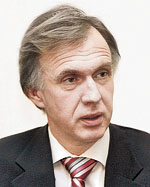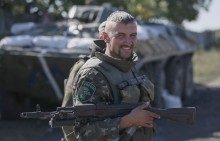Unfortunately, another round of sanctions against Russia, announced earlier by the European Union, was not implemented on September 9. Even though the EU member states managed to formally overcome the problem of the lack of consensus by the end of the day, the publication of the decision on sanctions and their implementation was postponed.
Late at night on Monday, President of the European Council Herman Van Rompuy said that “the package was adopted through written procedure.” But at the same time, he would not name the exact date of the publication. In this respect, his statement contains the following: “Publication and implementation of sanctions will take place in the next few days. This will leave time for an assessment of the implementation of the ceasefire agreement and the peace plan. Depending on the situation on the ground, the EU stands ready to review the agreed sanctions in whole or in part.”
This statement contrasts with Chancellor Angela Merkel’s assessment of the situation in Donbas. She said in an interview to the German radio station rbb-Inforadio that “Russia’s direct involvement in the Ukrainian conflict is too obvious.” If this is the case, why doesn’t the EU implement sanctions against the Kremlin? Even more so, after Merkel’s words, those sanctions are the only way to influence Russia which supports separatists in Ukraine. Moreover, according to NATO’s calculations, more than 200 tanks and 4,000 Russian troops are on the Ukrainian territory.
Since Merkel insists that military settlement of the conflict in Donbas is out of the question, it is logical to fully use the only tool available to the EU: sanctions.
It is surprising Finland opposed sanctions this time. Before, Slovakia, the Czech Republic, Hungary, and Austria were main opponents of the introduction of restrictive measures against Russia. On Monday, during an emergency meeting of the EU officials, Finland’s Prime Minister Alexander Stubb expressed concerns relating to the new round of the EU’s sanctions against Russia. In the end he signed the document, but insisted on postponing its publication. Stubb wrote on his Twitter page: “It is obvious Finland supports the EU sanctions against Russia. But there are hopes situation in Ukraine will improve as soon as possible, then sanctions will not be necessary.” But now it can be said for sure that Finland joined the ranks of Putin’s friends, even though its prime minister is considered to be an Atlanticist.
The Day asked Volodymyr Ohryzko, former foreign minister of Ukraine, to comment on the EU’s indecision and unreadiness to implement another round of sanctions against Russia.
“THERE IS STILL NO DECLARED UNITY WITHIN THE EUROPEAN UNION”
 “This is a sign that firstly, the European Union continues being uncoordinated, and secondly, it is evidence that selfish national interests take over universal value parameters in some countries. Thirdly, Russia might have succeeded in creating its corrupt lobby in the European Union countries, which starts acting during such critical moments. It shows that there is still no declared unity within the European Union.”
“This is a sign that firstly, the European Union continues being uncoordinated, and secondly, it is evidence that selfish national interests take over universal value parameters in some countries. Thirdly, Russia might have succeeded in creating its corrupt lobby in the European Union countries, which starts acting during such critical moments. It shows that there is still no declared unity within the European Union.”
How can you comment on the fact that this time it was not the usual list (the Czech Republic, Slovakia, and Hungary), but Finland’s prime minister, who has a reputation of an Atlanticist, who virtually blocked the implementation of the agreed sanctions?
“He said that it would allegedly threaten Finland’s national interests. I think this is a very generalized wording, which can be found in any case. That is, in other words this means that Finland demonstrated once again (and unfortunately, it is not its first political step of this kind) that Russian tourists who come to Finland and buy goods there are more important than lives of Ukrainians who are killed by Russian aggressors. It is very cynical, but unfortunately, it is true.”
What is your general assessment of this round of sanctions? Are they painful enough for Russia to influence its behavior?
“As regards sanctions against Rosneft, this is one of the crucial sectors for Russia, involving gas and oil. If we look at Russia’s export revenue structure, these two are key articles. That is why a blow to oil industry is a serious business, especially if it is complemented by changes in global oil markets. And we can see the origins of this tendency, which means the situation might become grave. Also, if specific large defense sector enterprises are mentioned, which are more of symbolic, rather than of practical use for Russia, it may have not only economic, but psychological impact in this case. So, in general, the implementation of sanctions would be a positive thing. But I am worried by the fact that the announced formulation says that sanctions can be intensified or canceled. I wonder whether Crimea is not enough of a reason to not only intensify these sanctions, but to take them to the final stage. So, unfortunately, this is another evidence that principles proclaimed by the European Union remain on paper, while in many cases primitive financial interests take over. This is a great disadvantage for the contemporary European Union.”
What signal does the EU send to Putin by postponing the implementation of sanctions, while the EU and NATO emphasize not only withdrawal of Russia’s troops from eastern Ukraine, but returning Crimea to Ukraine in their statements?
“It is a signal Putin has been waiting for and now he will boost this thesis and say that there is no unity in the European Union, which is true, unfortunately, and continue acting to the same principle: divide and conquer. It is a pity our Finnish colleagues do not understand, or to be more precise, they forgot their history of relations with Russia. Perhaps, time will come when Russians remind them about it.”
“Finns who rule the country now must leaf through the pages of their own history and draw conclusions”
By the way, in an interview to The International New York Times, former ambassador of Finland to Russia and Germany Rene Nyberg did not agree with an opinion expressed by former US national security advisor Zbigniew Brzezinski, who used the term “Finlandization” and said that the only possible course for Ukraine is to accept Russia’s rule. The former ambassador reminded that once president Urho Kekkonen told the then Soviet rulers that his country would defend its independence and that blocking integration with the West will harm not only Finland, but the Soviet Union as well. How can you comment on that?
“You see, even though he was a president who accepted the Finlandization policy, policy of some political concessions for the sake of freedom, he also understood that it is possible to talk to Russia from the position of force only. It does not understand a different language. That is why Finns who rule the country now should leaf through the pages of their own history and draw conclusions, otherwise it will just repeat itself, but in a much more terrible way.”
In this article former ambassador Nyberg emphasized Kekkonen’s words: “We will protect our independence, as we did in 1939 and 1944.” For some reason, this quote is not given in Russian translations.
“This is the thing, unfortunately, not only Finland, but other European capitals for some reason remember only last three to five years of history. But they do not want to come back to the depths of even a hundred years old, let alone a deeper research into Russian history. If they did it, they would understand who they are dealing with. Unfortunately, due to gas and any other corruption Russia managed to create its fifth column in the West, through which it acts today, and the West does not understand that after all they will become the next victims of the aggressor. No conditions and agreements are valid for them if they do not coincide with their interests.”
“UNFORTUNATELY, THE MEETING IN MINSK BECAME ONE OF THE STEPS OF CREATING A TERRITORY IN THE EAST, CONTROLLED SOLELY BY PUTIN”
We did not receive support we expected at the NATO summit, but at the same time, the so-called protocol on regulation of the situation in Donbas was signed with separatists in Minsk. The EU postponed the implementation of sanctions against Russia again. The president’s advisor, leader of Petro Poroshenko’s bloc Yurii Lutsenko said that according to this protocol, a third of Donbas territory will receive a special status as a part of integral Ukraine. How can Ukraine preserve the sovereignty and territorial integrity in this situation?
“As you know, Transnistria has special status within the allegedly territorially integral Moldova. What does this mean? It is a part of territory which is not controlled by the central government. And now it is Putin’s main goal to close Ukraine on two sides. On the one hand, there is Crimea, where all these things related to the fastest involvement of Crimea in Russian legal, economic, and any other field will continue. And also a source of tension will endure, because tension will be constantly formed at the administrative border with Kherson oblast. And on the other hand, there is a similar region in the east, where problems for Ukraine will continuously emerge. So, total destabilization is a goal. And as a result, effective blocking of movement towards the European Union. This is actually what Putin set as a goal for himself. Unfortunately, this meeting in Minsk became one of the steps of creating a territory in the east, controlled solely by Putin. I do not think he will agree to withdraw troops. Otherwise it would mean he would reject his older idea, because this so-called special zone has no chances of functioning if cut off of Ukraine. So, some enclave will be discussed, which will have a common border with Russia, which will be constantly crossed by green men, saboteurs, murderers, and terrorists. And as a result, life in this enclave will be formed not by local communities, which Moscow describes so beautifully now, but by executioners of Moscow’s will.
“So, I do not see any special success in this sense, even though I understand that the current state of our Armed Forces does not allow to perform things our military should be performing.”
So, we do not have options of regaining control over the part of Donbas occupied by terrorists and Russian troops?
“Regaining control would mean starting a war. Besides, it would be a war with an unknown outcome, given the deplorable state of the Ukrainian army. So, perhaps, it is a compromise we are forced to accept in order to get on our feet, preserve statehood and wait for a moment when Putin’s regime comes to an end.
“As for the introduction of martial law in Donbas, it must be a decision based on a very precise evaluation of the situation. If Russia’s military aggression continues, there is no other way but total mobilization of the whole country to the war and waging this war. And then it will be about introducing martial law not in some separate areas of Donbas, but, perhaps, in the whole country. However, it is a very risky step, because democratic elections, reforms, or anything else is out of the question under such circumstances. There is a very fine line we have to walk preserving our statehood, moving towards the European Union, towards NATO, and at the same time, blocking out the impact of this cancer tumor, which has been implanted in eastern Ukraine by our ‘everlasting strategic partner.’”








